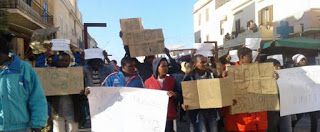Migrants died below the deck, those bodies we want to ignore
They
left in the night between Friday and Saturday from the Libyan city of Zwara.
There were 326 people from Syria, Sub Sahara, Pakistan and Bangladesh. Today,
however, only 313 of them touched the ground at the port of Catania with their
own feet. The remaining 49 breathed their last breath below the decks of the
boat in which, in the paradoxical and absurd hierarchy of the poorest of the
poor, they had been relegated to “the third class”. They died from
the inhalation of toxic gas, asphyxiation, suffocation and drowning. They died
from desperation and from having too much hope.
The
ship Siem Pilot, part of the
Norwegian Marines and currently in service as part of the Frontex fleet,
reached the port of Catania at 11am. There were 416 migrants aboard and 9
corpses; the results of two separate rescue operations: the first, where the
tragedy occurred, had been intercepted by the marine military ship Cigala Fulgosa; the second involved a
German ship which had rescued a boat with 103 migrants aboard south of
Lampedusa. According to the statement of the Commander, Lisa Dunham, the health
condition of those aboard was good with the exception of a few women who were
pregnant and a few others who were suffering from minor illnesses. Those aboard
included five children with their parents and a further fifteen unaccompanied
minors. No further information was given. Disembarkation took around four hours
to complete, under the cameras of the press and the eyes of the authorities,
the coast guard, members of Frontex, the financial police, the police and the
military police. Once off the boat, the migrants were photographed and had to
undergo a medical check up by the Red Cross. They were then moved to a cordoned
off area where coaches were waiting to transport them to various areas of
Italy. At around 3.30pm, a crane removed a large white container from the Siem Pilot which was understood to
contain the bodies of the deceased. The whole operation lasted about 10 minutes
in total. The time to load the shameful container onto a lorry and make it
disappear in order to avoid offending anyone. It was a clean, perfumed and
sterile operation.
It
is a story we have already seen, one which is being repeated everyday. It is
the life of thousands of people who do not deserve indifference or cynicism,
but demand the right to answer with integrity.
Beatrice
Gornati
Borderline Sicilia Onlus
Translated by Claire Owen



